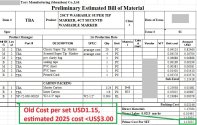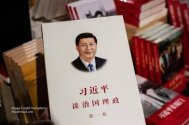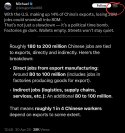The problem with the US strategy lays with its execution and lack of a defined goal. I will play devil advocate and say that the US actually had good leverage in the consumer and financial markets, but too many conflicting goals, lack of time, lack of a coherent plan of action and most importantly lack of any preparations, effectively kills any chance of achieving any of their stated objectives.The US believes it can get away with this strategy because it is a financial super power. Companies will be tempted to build their entire supply chains in the US because the US consumer and government subsidies can make it worth their while. Or so the logic goes, it remains to be seen whether there's any actual way this works, since if you don't get enough companies taking the bait, you'll just build a rent seeking industry that survives entirely off of subsidies and the captive market, and which never becomes globally competitive.
China was smart enough not to fall into this trap in most industries, because it strategically used subsidies to create globally competitive companies, and then forced them to compete globally via welcoming world class competitors like Tesla into the domestic market.
The exception is internet companies. Unfortunately, Baidu is a great example of what happens when you only have the first half of the strategy and not the second half. Not having to compete at all with Google, Baidu effectively became just a rent seeking company living off of a captive market and never became globally competitive.
The problem with internet companies, I think was more an underestimation of just how large of a sector it turned out to be, as well as a the amount of control that needed to happen.
If you think about it there was actually a lot more than just Baidu, there was Tencent, Alibaba and some other smaller companies, but the others ended up focused on a section of the sector, Tencent with games, Alibaba with e-com, leaving only Baidu on the search engine side.
You also have to think back to those days, the coding was pretty bad at the beginning leading higher labour needs, the hardware was extremely expensive, therefore It was capital and labour intensive to build an internet companies. Having built up a few was already a pretty great run. Its just that they ended settling for different sections within the IT software space.
There was also an another factor to Baidu’s global competitiveness and that has nothing to do with whether it could actually compete. It has more to do with the negative views the US has fostered in the rest of the world has and the actual censorship that happens on Baidu, we might dismiss it but it’s one of those things that the west tends to twist their panties about, while they do their own censorship.




